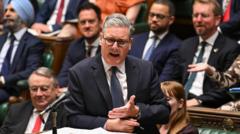Is Starmer's Authority at Risk with MP Suspensions?

Understanding the Labour Party's Internal Turbulence: A Closer Look
The recent shake-up within the Parliamentary Labour Party (PLP) has sparked significant discussion among political analysts and party members alike. In July, a month reminiscent of the previous year, Prime Minister Keir Starmer made the bold decision to remove the whip from four Labour MPs, allowing them to sit as independents. This move is not an isolated incident; rather, it reflects ongoing tensions within the party. As the political landscape continues to evolve, understanding the implications of these actions is crucial for grasping the future direction of the Labour Party.
The Context: A Year of Change
Last year's decision to remove the whip from seven Labour MPs who opposed the two-child benefit cap was a clear signal of Starmer's intention to maintain discipline within the party. Fast forward to this year, and we find ourselves in a similar situation. Just before Parliament's summer recess, the Prime Minister again exercised his authority, stripping the whip from four MPs and removing three from their roles as trade envoys. This repetition of events raises critical questions about the party's internal dynamics and the effectiveness of Starmer's leadership.
Rebellion and Loyalty: The New Labour Dilemma
One of the key issues at play is the tension between loyalty to the party and the desire for individual MPs to voice their concerns. The four MPs who lost the whip were called in one by one to meet with Chief Whip Sir Alan Campbell shortly after Prime Minister’s Questions. The implications of such actions are profound, as they signal to other Labour MPs that dissent may come with severe consequences. While some may view this as necessary discipline, others perceive it as a stifling of debate and a reflection of weakness in leadership.
Emotional Fallout: Voices from the Inside
The emotional toll on those affected is palpable. One suspended MP described their feelings as "emotional" and "devastated," highlighting the personal impact of political decisions. Such sentiments are echoed among other Labour MPs, who have described the situation as "ridiculous," "petty," and "vindictive." The emotional landscape within the party is complex, as individuals grapple with the implications of their actions and the responses they elicit from leadership.
Strategic Calculations: Timing and Authority
Downing Street's rationale for the timing of these suspensions rests on the idea of asserting authority and preempting potential rebellions, especially regarding sensitive issues like special educational needs provision in England. Senior figures in the party emphasize that these actions were not merely punitive but a response to a pattern of behavior that undermines party unity. The hope is that by taking a firm stance, Starmer can consolidate control and navigate the party through turbulent waters.
Political Dynamics: The Role of Trade Envoys
Trade envoys play a significant role in the Labour Party's outreach and engagement efforts. The decision to remove three MPs from their unpaid trade envoy positions sends a clear message: loyalty is paramount, and voting against the government on welfare issues is incompatible with representing the party externally. This move raises questions about representation and diversity within the party, as all three individuals who lost their envoy roles belong to minority ethnic backgrounds, while Liberal Democrats in similar positions are treated differently.
The Impact on Party Morale
The morale within the Labour Party appears to be at a low ebb. Observers have noted that such drastic measures may exacerbate divisions rather than heal them. Comments from within the party suggest that these actions could further alienate members and councillors, leading to a detrimental impact on grassroots support. The specter of past leaders like Harold Wilson and Tony Blair looms large, with many questioning whether such an approach aligns with the values and strategies of previous Labour leaderships.
Leadership Styles: A Shift in Approach?
In light of recent events, Prime Minister Starmer has increased his engagement with MPs, attempting to counter criticisms of being too detached. His efforts to spend more time with party members, including post-Prime Minister’s Questions lunches, hint at a desire for a more collaborative atmosphere. However, this softer approach appears to coexist with a stricter enforcement of party discipline, creating a complex dynamic that raises further questions about the effectiveness of Starmer's leadership style.
Looking Ahead: The Future of the Labour Party
As the Labour Party heads into the summer recess, the consequences of these disciplinary actions will become more apparent. Starmer must navigate the delicate balance between maintaining party unity and allowing for healthy dissent. The challenge lies in fostering an environment where diverse opinions can coexist without fear of reprisal, ensuring that the party remains a vibrant forum for debate and discussion.
FAQs
What does it mean to have the whip removed in the Labour Party?
Having the whip removed means that an MP is no longer recognized as a member of their party in Parliament and must sit as an independent. This often occurs when an MP votes against party lines.
Why did the Prime Minister remove the whip from these MPs?
The Prime Minister removed the whip as a disciplinary measure to assert control and discourage further rebellions within the party, particularly regarding sensitive issues like welfare reforms.
How does this impact the Labour Party's internal dynamics?
The removal of the whip can create tension within the party, as it raises concerns about freedom of expression and the consequences of dissent. It may also affect party morale and grassroots support.
What are the roles of trade envoys in the Labour Party?
Trade envoys are responsible for promoting trade relationships and representing the party's interests in various sectors. They are often expected to align with party policies, making dissent challenging.
What does the future hold for the Labour Party?
The Labour Party faces a pivotal moment as it navigates internal divisions and seeks to maintain unity. The effectiveness of Starmer's leadership and the party's ability to balance discipline with open dialogue will shape its future trajectory.
As the Labour Party grapples with these challenges, one must ponder: can unity be achieved without stifling dissent, or is there an inherent tension in the quest for party discipline? #LabourParty #PoliticalDiscipline #KeirStarmer
Published: 2025-08-01 17:16:16 | Category: sport



